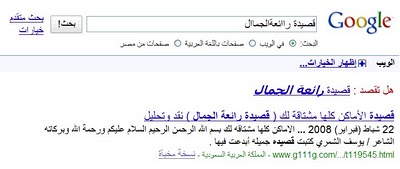A recent improvement for Arabic searches
For example, the queries [] and [ ] have an identical meaning (Ministry of Education) and they're both written in a common form for Arabic documents. But they have different, albeit correct, formats — the first query is written as a single word, while the second is written as two. Google needs to understand that while they're written differently, they mean the same thing and should yield the exact same search results. In this example, both queries were written correctly, just in different formats. But sometimes people just make errors — like repeating the same letter twice. For example, you might write [ ], repeating the letter "" twice in both query words. In this case the correct spelling should be [ ]. It's important that Google search recognizes your query — despite spelling errors.
To address issues like this, we recently developed a search ranking improvement that targets certain Arabic queries. Our algorithm employs rules of Arabic spelling and grammar along with signals from historical search data to decide when to leave out spaces between words or when to remove unnecessarily repeated letters. Now, when you type a query leaving out spaces or repeating a letter, we'll return better results based not only on what you typed, but also on what our algorithm understands is the "correct" query. For example, here's what happens when you type [] ([amazingly beautiful poem] in Arabic) with repeated letters and dropped spaces between words.

As you can see, the Google results contain the corrected query, the terms , in bold.
For most people, this might seem like a small enhancement. But for us, it’s a big change. Our tests show we've improved search for 10% of Arabic language queries. Which, when you think about it, is a lot of people.
Moustafa Hammad and Mohamed Elhawary, Software Engineers, Search Quality Team
googleblog.blogspot.com
published @ February 2, 2010